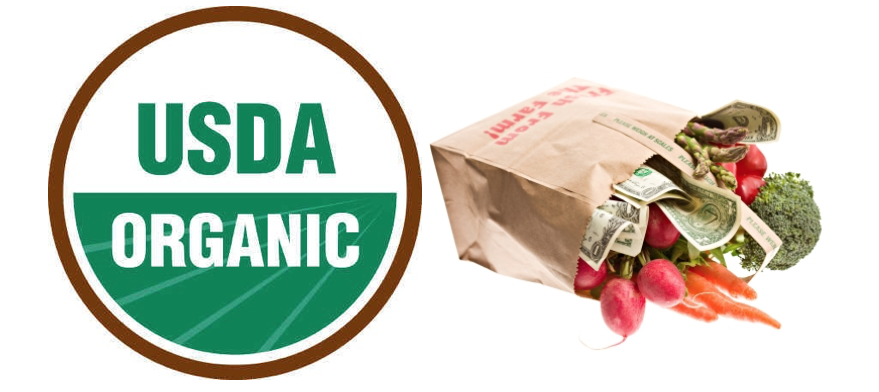
By Charlie Bausman
Organic food has exploded across super markets nationwide over the past decade. It represents that fastest growing food market in the United States with $43.3 billion in sales in 2016. This represents a 10.8% increase in a single fiscal year. For comparison, the overall food market grew at only 3.3%.
We were curious to find out what the big deal is. What does “organic” actually mean? Is it that much better for you nutritionally? What’s the cost difference?
At the end of the day, is it worth it? The answer from our research is simply “no.”
Labeling Standards
The USDA (US Dept. of Agriculture) has multiple food quality standards which determine whether a product can use the “USDA Organic” seal or use “organic” language on the label. The following is directly from the USDA website in the requirements they hold for organic products.
- Produced without excluded methods (e.g., genetic engineering), ionizing radiation, or sewage sludge
- Produced per the National List of Allowed and Prohibited Substances (National List)
- Overseen by a USDA National Organic Program authorized certifying agent, following all USDA Organic Regulations
So what do all those different labels mean? Here’s how it breaks down:
- 100 Percent Organic – This is the no kidding, fully organic stuff. All ingredients and processing aids must be certified organic and label must state the name of certifying agen.
- Organic – This means the product is 95% organic. The other 5% is “non-organic content” excluding salt and water. This can still use the USDA Organic seal.
- “Made With” Organic – The product is made up of at least 70% organic ingredients. The USDA Organic seal is not allowed on this product, but the labeling can still state it’s made of organic ingredients.
- “Natural” – This means absolutely nothing. It is not certified by the USDA, FDA or any other agency. In fact, the FDA doesn’t even have a definition for “natural” as labeled on food products. We’re willing to assume that the price point for that product will be significantly higher than its non-natural competitor.
Cost Comparison
A in depth study by Consumer Reports compared organic food prices from various grocers versus prices of regular, non-organic food.
With the exception of carrots, organic food (regardless of grocer) was always more expensive. The percentages varied, but organic eggs from Harris Teeter took first place for the highest markup at 196 compared to regular eggs.
Organic maple syrup was on the low end, actually retailing for 2% less than it’s non-organic competitor at Whole Foods.
Across all grocers and varying food products, the organic option was on average 46% more expensive.
We traveled to our local supermarket to see if the prices from the Consumer Reports study were accurate at the local level here in Jackson, Wyoming. The results were nearly identical.
Nutritional Value
With the organic food prices averaging 50% higher than their non-organic competitors, the nutritional values must be through the roof, right?
Science hasn’t quite caught up to that assumption.
A medical study titled Are Organic Foods Safer or Healthier Than Conventional Alternatives?: A Systematic Review published by Annals of Internal Medicine reviewed 240 human and nutritional studies which analyzed the benefits of organic foods. It found the “…published literature lacks strong evidence that organic foods are significantly more nutritious than conventional foods.” This study was cited by Harvard Medical School with similar conclusions.
Multiple studies do confirm that organic foods have higher levels of antioxidants and lower levels of pesticide residues and small metal traces commonly associated with particular kinds of fertilizers. Additionally, livestock which are raised and processed organically are never given antibiotics, which this study claims may serve as a tool to reduce the the growing strains of antibiotic resistant bacteria.
The Center for Disease Control (CDC) lists antibiotic resistance as “one of the world’s most pressing public health problems.” As the name implies, bacteria from slaughtered meat has grown resistant to antibiotics used in livestock. The bacteria can then be transferred to humans, where the same antibiotics used to combat illness are no longer viable against that strain of bacteria.
However, the only known way for a human to contract these antibiotic resistant bacterias is by handling/eating raw meat, with contact from the animal stool, or from touching/caring for the animals. The average supermarket consumer family is likely at a lower risk.
The scientific foundation that organic food is healthier is not solidified, and seems that the results are in fact a wash. When paired with the significant price increase of organic foods, it’s questionable whether the 50% price mark up for organic is worth the marginal nutritional advantage you might receive.
Comments/Feedback?
Email coach@mtntactical.com
Resources
http://www.consumerreports.org/cro/news/2015/03/cost-of-organic-food/index.htm
http://annals.org/aim/article/1355685/organic-foods-safer-healthier-than-conventional-alternatives-systematic-review
http://www.health.harvard.edu/blog/organic-food-no-more-nutritious-than-conventionally-grown-food-201209055264
http://www.mayoclinic.org/healthy-lifestyle/nutrition-and-healthy-eating/in-depth/organic-food/art-20043880
http://time.com/3823870/record-organic-producers-united-states/
http://www.livescience.com/10558-organic-local-food.html?_ga=2.70109528.936945.1493745564-1336008349.1493745564
https://www.ota.com/resources/market-analysis
https://www.ams.usda.gov/sites/default/files/media/Labeling%20Organic%20Products%20Fact%20Sheet.pdf
https://www.fda.gov/aboutfda/transparency/basics/ucm214868.html
https://www.ams.usda.gov/grades-standards/organic-labeling-standards
Readers Comments
I just read your article on organics and whether their cost premium is justified. I think you missed the main point of organics in your assessment: buying organics is about what’s NOT in them, not what IS in them.
- Produce as much of your own food as you can using minimal synthetic inputs
- Buy from local farmers/ranchers, with preference towards people who follow organic or similar principles (but don’t penalize them for not paying for the certification)
- Buy organic from the supermarket
- Buy conventional from supermarket
I just finished reading your article on organic foods and if they are worth the cost. I can’t speak for everyone but for myself I don’t choose organic because its nutritionally better i choose them because whats not in it: gmo’s, synthetic pesticides, synthetic flavor additives (think msg), synthetic preservatives, and synthetic flavors or colors. Also because organic farming is much better for the earth and the environment we all have to live in.
